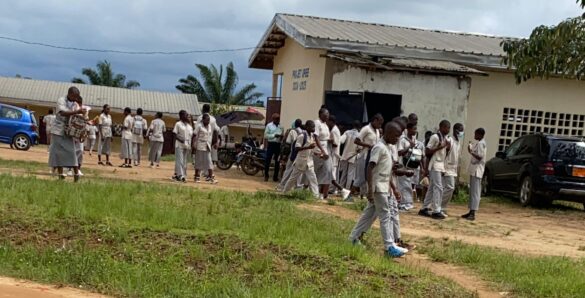In Kribi, a coastal city in the south region of Cameroon, the waves crash gently as they wash up on the shore. Beyond its tourist appeal and economic potential, it has become a safe harbour for many fleeing the armed conflict in the country’s Northwest and Southwest regions.
Ebage Ndelle Catherine, 14, is one of them. She was just five years old when the armed conflict broke out in Cameroon’s two English-speaking regions.
The conflict—codenamed the Anglophone Crisis—began in 2016 as protests over grievances regarding language and cultural rights, with teachers and lawyers opposing the imposition of French education and justice systems on the minority English-speaking regions of Cameroon by the majority Francophone-led government. Although the protests were largely peaceful, the government used lethal force to suppress them; dissent quickly escalated into a secessionist armed movement, which has continued for nine years and counting, resulting in over 6,000 deaths.
Ebage’s earliest memories are of gunfire and hiding in bushes. “As a baby, my parents would carry me and run into the bushes of Tombel—a conflict hotspot in the Southwest region—to escape the gunfire.”
The conflict not only threatened her life but also cost her years of education. Yet, her family remained determined. After two years with no end in sight, Ebage’s family fled to Kribi in 2018 following a severe separatist attack in their community, but her father stayed behind. She hasn’t seen him since.
“My dad refused to leave at first. He said he’d rather die than leave his house and farmland.” The uncertainty about his safety weighs heavily on her each passing day. “I’m so afraid with every day that passes,” she says with her voice cracking. “I’m always praying for God to protect him.”
Ebage might have escaped the bullets but not the trauma. In Kribi, she struggles to keep up with her peers. “I was traumatised,” Ebage says, in a faint tone. “I interacted less with people. I was afraid.”
Each time she tries to remember these events, her voice fails. Though physically in Kribi, her mind is elsewhere. She misses home dearly.
Despite this, she’s resolved. She wants to become a makeup artist and designer. “I want to finish my education and go for further studies [abroad],” she says, this time, with conviction, and a toothy smile lining her face.
Just like Ebage, Tiola Loïc, 15, has also found a haven in Kribi. I lost one year of school because of the crisis, but I’m determined to catch up and achieve my dreams,” Tiola says.
Tiola hails from the Northwest regional capital of Bamenda. Though far from home, he’s nursing hopes to help end the war back home someday.
“I want to stop the war in Bamenda,” he says, this time, a promise, not mere wishful thinking. “I want to help bring peace to my community. To do that, I need education”
Despite Ebage and Tiola’s determination to pursue an education, the trauma of war and the challenges of being internally displaced sometimes overwhelm them. Thankfully, Teachers are trying to help. Mr Numbe, Teacher, says understanding each student’s background is key. “We take things gradually,” he says. “We use every means possible to ensure our students succeed.” He says IDP students often struggle to grasp new concepts. He knows the feeling too well because he too, is displaced.
“Teaching a mixed class of challenging,” he says. “But many of the displaced students are happy to be learning again.
Mr. Numbe is Anglophone History Teacher – prefers to identified by his first name. He teaches history and citizenship at Government Bilingual High School De Dombe, Kribi.
Beyond the efforts of teachers, humanitarian workers are stepping in too, to empower those who may have lost hope of getting an education due to the lingering conflict.
Leslie Shey is the founder of the Lesley Foundation, says education is a fundamental human right and a key part of the UN’s sustainable development goals. His organization provides books and didactics to IDP students, especially girls.
“We work in communities where access to education is difficult. “It’s not just about providing education. It’s about providing a sense of normalcy and stability in times of chaos”
Psychological support is part of the package, he underscores. “We want these children to know they have a future and can achieve their dreams despite the challenges they’re confronted with.”
The impact of the armed conflict on education cannot be overstated. Many schools in the affected regions have been destroyed or closed, forcing thousands of children out of school.
The scale of disruption is vast. UNICEF estimates that 6,000 schools have been closed and more than 1.5 million children have had their education disrupted since the conflict began. But Ebagem and Teola are not giving up.
“I just want to go to school and be a better person,” Ebage says.. “I want to make a difference in my community.”
Their stories are a reminder: even in the shadows of war, hope survive
This work was produced as a result of a grant provided by the Cameroon Association of English-Speaking Journalists (CAMASEJ) as part of a project funded by Open Society Foundations.

